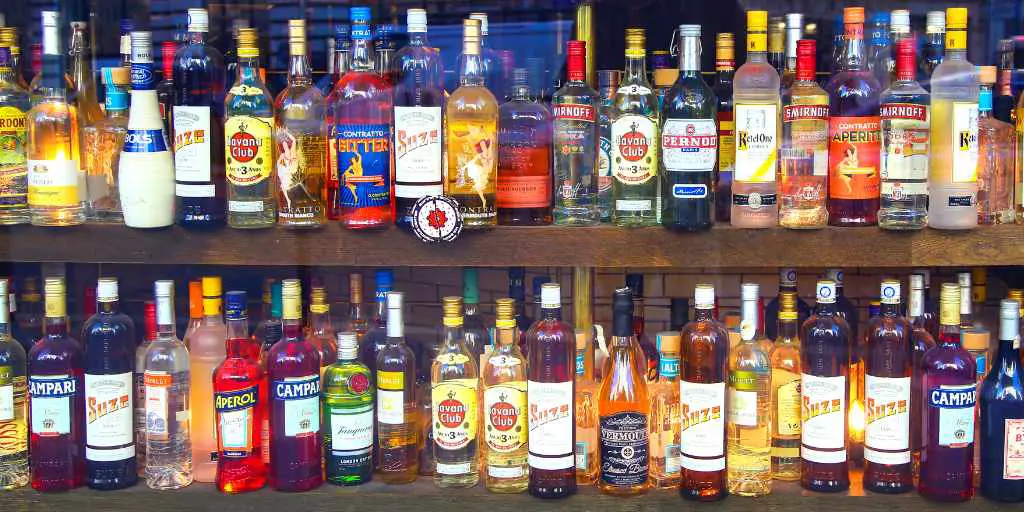A well-rounded selection of drinks is the cornerstone of any successful cocktail experience. Whether crafting beverages in a high-end bar or stirring up drinks in the comfort of a home kitchen, understanding the essential drinks for cocktails is crucial.
The art of mixology relies on a diversity of spirits, mixers, and techniques to create sippable masterpieces. This means having a well-stocked bar with versatile liquor choices and quality mixers and a grasp of the classic cocktails that have stood the test of time.
Key Takeaways
- A selection of essential spirits forms the foundation of versatile cocktail-making.
- Quality mixers and fresh ingredients are key to balancing flavours in cocktails.
- Proper preparation techniques and garnishes enhance the overall drinking experience.
Essential Spirits for a Well-Stocked Bar
Creating the perfect cocktail starts with a foundation of essential spirits. Each type of spirit brings its unique flavour profile and character to a variety of favourite cocktails.
Whiskies
Several types of whisky cater to different cocktails and palates. For a robust whiskey flavour in cocktails like the Old Fashioned, bourbon whiskey, with its rich sweetness, is indispensable. On the other hand, rye whiskey, known for its spicier and fruitier notes, also makes an excellent base for a whiskey cocktail. Don’t forget to include a blended scotch, which is versatile for drinking straight or in mixed drinks, and Irish whiskey for its smooth and generally lighter profile.
Rum
When it comes to rum, diversity is key. A well-rounded bar should have both light rums, for its subtle flavour in drinks like the Mojito, and dark rum, which provides a deeper molasses-like sweetness for a richly layered drink. A white rum is also a must-have for versatility in various cocktails.
Gin
There’s no substitute for a classic London Dry Gin, especially for crafting a timeless gin and tonic. Its crisp and herbal notes have made it a staple in any well-stocked bar. Additionally, considering a gin with a more contemporary botanical profile could also enhance your cocktail lineup.
Vodka
Vodka is essential in any bar as it is the most neutral-tasting and versatile distilled spirits. It’s the foundation of a vodka martini and can be easily mixed with almost anything without overpowering the drink’s flavour profile.
Tequila
For a touch of Mexican flair, tequila – an agave-based spirit – complements any bar. It’s important to have a top-shelf bottle of silver or blanco tequila for mixed drinks like the Margarita or a more aged variety like reposado for sipping neat or in more sophisticated cocktails.
Liqueurs
No bar is complete without a variety of basic liqueurs. The orange liqueur is critical for many classic cocktails, while the creamy sweetness of an Irish cream liqueur can’t be beaten for dessert drinks. Every bar should possess a selection of these to add complexity and sweetness to a range of favourite cocktails.
Key Mixers and Fresh Juices
In crafting cocktails, the right mixers and fresh juices are crucial for balancing flavours and adding depth to the drink. They range from sweet and acidic citrus juices to various sodas, tonics, and sweeteners, each playing a vital role in the mixology process.
Citrus Juices
Lemon juice and lime juice are foundational ingredients in cocktails, offering a fresh burst of acidity that can cut through sweetness and alcohol. They’re essential in classics like the Whiskey Sour and Margarita. Orange juice is sweeter and less tart, perfect for drinks like the Mimosa or Tequila Sunrise. Freshly squeezed citrus juices provide better flavour than their store-bought counterparts and are preferred for high-quality cocktails.
Sodas and Tonics
Club soda and ginger ale are versatile carbonated mixers that add fizz and a light touch to cocktails, commonly used in tall drinks. Tonic water brings a bitter edge due to its quinine, pairing well with spirits like gin for a classic Gin and Tonic. It’s important to avoid flat soda as its lack of carbonation can leave a drink dull.
Sweeteners
Sweeteners such as simple sugar syrup and sour mix are essential for achieving the right balance of sweet and sour. Simple syrup is a one-to-one mixture of sugar and water, often used to sweeten drinks without the grainy texture of undissolved sugar crystals. Sour mix, which combines citrus juice with sugar, provides a convenient and consistent way to add both sweetness and acidity to cocktails.
Other Juices
In addition to citrus, other juices like pineapple juice, cranberry juice, and tomato juice offer unique flavours. Pineapple juice adds tropical sweetness and is a staple in drinks like the Piña Colada, while cranberry juice provides a tart contrast, as seen in the Cosmopolitan. Tomato juice is the basis for the savoury Bloody Mary, and it’s often paired with spicy and umami flavours. When available, using fresh juice rather than ready-to-pour juices results in a higher quality and tastier cocktail.
Classic Cocktails and Variations
In the world of mixology, classic cocktails have stood the test of time, revered for their time-honoured recipes and the foundation they provide for innovative variations. This section is dedicated to the traditional and the twists of the old favourites, ranging from perfectly balanced stirred concoctions to effervescent highball and muddled drinks.
Stirred Cocktails
Stirred drinks are known for their clarity and smoothness. One time-honoured recipe is the Martini, which has inspired countless variations. A classic Martini calls for gin and dry vermouth, and it’s typically garnished with an olive or a lemon twist. Nowadays, variations like the Espresso Martini add a caffeinated kick to the traditional profile.
Martini Recipe:
- 2 oz Gin
- 1/2 oz Dry vermouth
- 1 or 3 Olives or a lemon twist for garnish
Shaken Cocktails
When a cocktail recipe calls for citrus or other fresh ingredients, shaking is usually the preferred method. The vigorous shaking action creates a well-mixed drink with a slightly aerated texture, making it both delicious and visually appealing. Mixed drinks like the Margarita or Daiquiri are classic examples where shaking is essential. These cocktails serve as a base for numerous variations by simply substituting the spirit or adding flavorful syrups or fresh fruits.
Daiquiri Recipe:
- 2 oz White rum
- 1 oz Fresh lime juice
- 3/4 oz Simple syrup
Highball & Muddled Drinks
Highball and muddled drinks are often vibrant and refreshing, offering a symphony of flavours. The Whiskey Sour traditionally combines whiskey with lemon juice and sugar, but muddling in fruits like berries can create a delightful variation. Another classic is the Mojito, where white rum, sugar, lime juice, soda water, and mint are muddled together for a refreshing highball perfect for a cocktail party.
Mojito Recipe:
- 2 oz White rum
- 1/2 oz Fresh lime juice
- 2 tsp Sugar
- 3 Mint leaves
- Soda water to top
Each of these categories embraces classic recipes that have inspired a world of delicious cocktails suitable for any event or gathering. Whether maintaining the revered simplicity of a stirred Vodka Soda or exploring the infinite possibilities of shaken or muddled mixed drinks, there’s no doubt that these classics provide a benchmark for great-tasting cocktails.
Cocktail Preparation Techniques
Mastering a selection of key cocktail preparation techniques is crucial for creating exceptional drinks. The use of specific glasses and tools can affect the taste and presentation of a cocktail, as well as the overall drinking experience.
Mixing
Mixing cocktails often involves stirring ingredients together to chill and dilute the drink without adding too much air. This is typically done in a mixing glass, using a long-handled spoon. Stirring is a gentle technique, ideal for spirit-forward cocktails, such as a classic Martini. Spirits, vermouth, and sometimes bitters are combined with ice in the mixing glass and stirred until the ingredients are sufficiently chilled and blended. Once mixed, the contents are strained into an old-fashioned glass or a rocks glass, depending on the cocktail being served.
Shaking
Shaking is a more aggressive technique employed to mix and chill ingredients while aerating the drink. A cocktail shaker is filled with the desired ingredients and ice, then shaken vigorously, usually for 10-15 seconds. This method is suited for cocktails that include mixers like fruit juices, cream, or eggs, where emulsification or thorough integration of flavors is desired. After shaking, the concoction is typically strained into a chilled glass, which could be any style, ranging from a rocks glass to a delicately stemmed coupe, depending on the drinking style and cocktail recipe.
Muddling
Muddling is used to release the flavors and aromas of fresh ingredients such as herbs, spices, and fruits. This technique involves pressing the ingredients against the bottom of a sturdy glass in a gentle, twisting motion. A rocks glass or an old fashioned glass can be used for this purpose. The muddled ingredients are then often mixed with other components of the drink either by stirring or shaking, imparting a deep, well-integrated flavor profile to the final cocktail. Muddling is an essential step in creating cocktails like the Mojito or Old Fashioned, where the expression of fresh ingredients is key to the character of the drink.
Garnishes and Final Touches
Cocktail garnishes are essential for enhancing both the flavor profile and the visual appeal of a drink. They serve not just as decorations but also as integral components that can complete the sensory experience of a cocktail.
Citrus Peels and Wheels
Citrus Peels: The use of orange peel garnishes contributes to a cocktail’s aromatic complexity. Rubbing an orange peel around the rim of the glass and twisting it above the drink expresses oils, introducing hints of citrus and a subtly bitter edge, perfect for accentuating the smoky undertones of a slightly aged reposado or the savory flavor of a complex drink.
Citrus Wheels: Slices or wheels of citrus fruits not only add a cheerful aesthetic but also a touch of tartness to balance the sweetness in tropical drinks. A lime wheel can bring out the zest in an agave-based spirit, while a lemon slice may complement the floral notes in a cocktail featuring floral liqueur.
Herbs and Spices
Herbs: Fresh herbs like mint or basil deliver a burst of fresh flavors and a fragrant bouquet. Properly bruising herbs releases essential oils, contributing an authentic taste that can elevate the simplest mix of fresh limes and all the sugar in a classic mojito.
Spices: A dash of spice, such as cinnamon or nutmeg, can warm up a drink and lend a complex aroma. For cocktails like those mixed with melon liqueur or crème de cacao, spices can add a layer of depth that juxtaposes the sweetness effectively.
Other Garnishes
Edible Additions: Garnishes can range from the classic cocktail olive to the more adventurous, like a strip of crispy bacon in a drink laced with Tabasco sauce. These additions are chosen to complement the main flavors of the cocktail, reinforcing or contrasting the key notes as needed.
Sugars and Salts: The rim of the glass can be lined with sugar or salt, enhancing or toning down certain tastes; for example, salt can suppress bitterness while highlighting the sweetness in a drink, whereas sugar rims are perfect for sipping with creamier liqueurs like coffee liqueur.
Frequently Asked Questions
This section addresses common queries about the essentials for crafting a wide array of cocktails, from basic spirits and mixers to foundational cocktail recipes.
What are the top spirits every home bar should stock for cocktail making?
Every home bar should include a selection of base spirits such as vodka, white rum, gin, whiskey, tequila, and brandy. These spirits are versatile and can be used to create a multitude of cocktail recipes.
Which cocktail mixers should I always have on hand?
A well-prepared bar should stock various mixers including club soda, tonic water, ginger beer, and a range of fruit juices such as orange, cranberry, and pineapple. Sweeteners like simple syrup and grenadine are also essential for balanced cocktail creations.
What are the classic cocktails that every bartender should know?
Classic cocktails include the Gin Martini, Mojito, Old Fashioned, Margarita, Manhattan, Whiskey Sour, and Negroni. Mastery of these cocktails is crucial for any bartender as they are frequently requested and serve as a foundation for many variations.
What are some simple yet essential cocktails for beginners to prepare?
Beginners should start with simple recipes, such as the Daiquiri, Whiskey Highball, Aperol Spritz, and Espresso Martini. These cocktails require only a few ingredients and basic techniques, making them perfect for those new to mixology.
What is a list of versatile ingredients that can be used in multiple cocktails?
Versatile cocktail ingredients include citrus fruits (lemons, limes, oranges), mint, bitters, and a range of liqueurs such as vermouth, triple sec, and amaretto. These components can enhance and diversify the flavor profile of countless cocktails.
Can you name a few essential non-alcoholic beverages that are commonly used in cocktails?
Essential non-alcoholic beverages for cocktails include seltzer, tonic water, various sodas, and fruit juices. These can be used as mixers for highballs and other cocktails, contributing to the beverage’s volume and taste without additional alcohol content.






